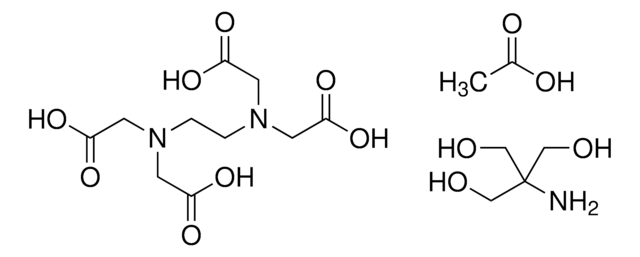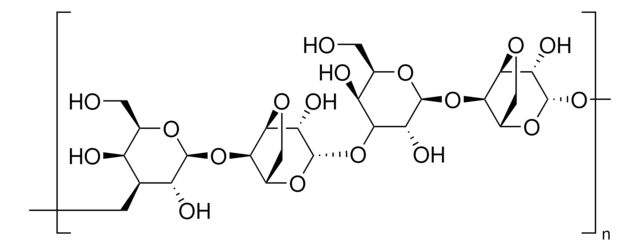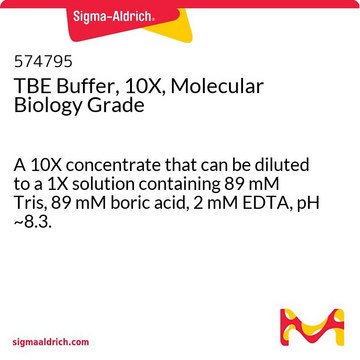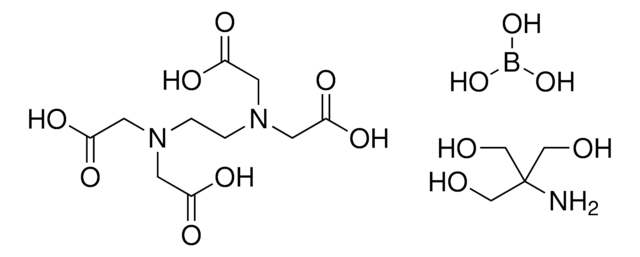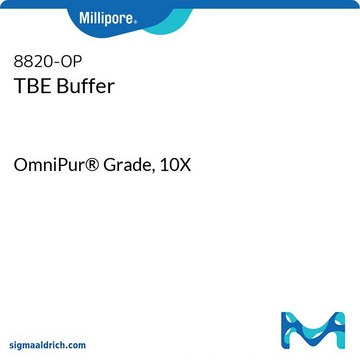574797
TAE Buffer, 10X, Molecular Biology Grade
A 10X concentrate that can be diluted to a 1X solution containing 40 mM Tris, 40 mM acetate, and 1 mM EDTA, pH ~8.3.
Synonym(s):
Tris-Acetate-EDTA Buffer
Sign Into View Organizational & Contract Pricing
All Photos(1)
About This Item
UNSPSC Code:
12161700
NACRES:
NA.25
Recommended Products
form
liquid
manufacturer/tradename
Calbiochem®
storage condition
OK to freeze
desiccated
technique(s)
electrophoresis: suitable
foreign activity
DNase, RNase, protease, none detected
shipped in
ambient
storage temp.
15-25°C
General description
Tris, acetate, and ethylenediaminetetraacetic acid (TAE) buffer consists of tris(2-amino-2-[hydroxymethyl]-1,3-propanediol) base, acetate, and ethylenediaminetetraacetic acid (EDTA). This is one of the most used running buffers in nucleic acid electrophoresis. TAE buffer improves the separation or resolution of large DNA fragments.TAE, a standard buffer, is mainly used to perform agarose gel electrophoresis of DNA and RNA in slab gels. TAE is one of the commonly used buffers in every biochemistry and molecular biology laboratory.
Application
TAE Buffer, 10X, Molecular Biology Grade - Calbiochem has been used in 1X concentration for the preparation of agarose gel and as a running buffer in gel electrophoresis.
Warning
Toxicity: Irritant (B)
Preparation Note
Dilute 1:10 with H₂O to prepare a 1X solution.
Legal Information
CALBIOCHEM is a registered trademark of Merck KGaA, Darmstadt, Germany
Signal Word
Warning
Hazard Statements
Precautionary Statements
Hazard Classifications
Eye Irrit. 2
Storage Class Code
12 - Non Combustible Liquids
WGK
WGK 1
Flash Point(F)
Not applicable
Flash Point(C)
Not applicable
Certificates of Analysis (COA)
Search for Certificates of Analysis (COA) by entering the products Lot/Batch Number. Lot and Batch Numbers can be found on a product’s label following the words ‘Lot’ or ‘Batch’.
Already Own This Product?
Find documentation for the products that you have recently purchased in the Document Library.
Customers Also Viewed
Bin Li et al.
Nature protocols, 13(5), 899-914 (2018-04-07)
Cpf1, a CRISPR endonuclease discovered in Prevotella and Francisella 1 bacteria, offers an alternative platform for CRISPR-based genome editing beyond the commonly used CRISPR-Cas9 system originally discovered in Streptococcus pyogenes. This protocol enables the design of engineered CRISPR-Cpf1 components, both
Our team of scientists has experience in all areas of research including Life Science, Material Science, Chemical Synthesis, Chromatography, Analytical and many others.
Contact Technical Service